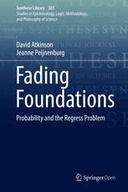Explore
Fading Foundations: Probability and the Regress Problem
David Atkinson and Jeanne Peijnenburg
2017
This book addresses the age-old problem of infinite regresses in epistemology. How can we ever come to know something if knowing requires having good reasons, and reasons can only be good if they are backed by good reasons in turn? The problem has puzzled philosophers ever since antiquity, giving rise to what is often called Agrippa's Trilemma. The current volume approaches the old problem in a provocative and thoroughly contemporary way. Taking seriously the idea that good reasons are typically probabilistic in character, it develops and defends a new solution that challenges venerable philosophical intuitions and explains why they were mistakenly held. Key to the new solution is the phenomenon of fading foundations, according to which distant reasons are less important than those that are nearby. The phenomenon takes the sting out of Agrippa's Trilemma; moreover, since the theory that describes it is general and abstract, it is readily applicable outside epistemology, notably to debates on infinite regresses in metaphysics. The book is a potential game-changer and a must for any advanced student or researcher in the field.
This book is included in DOAB.
Why read this book? Have your say.
You must be logged in to comment.
Rights Information
Are you the author or publisher of this work? If so, you can claim it as yours by registering as an Unglue.it rights holder.Downloads
- 26 - pdf (None) at Google Books.
- 119 - pdf (CC BY) at Unglue.it.
Keywords
- Epistemic Justification
- Epistemology
- Ethics
- Infinite Regress
- Metaphysics
- Philosophy
- Regresses in Epistemology
- Regresses in Ethics
- Regresses in Metaphysics
- Regresses in Philosophy of Mind
Links
web: https://link.springer.com/book/10.1007/978-3-319-58295-5Editions


